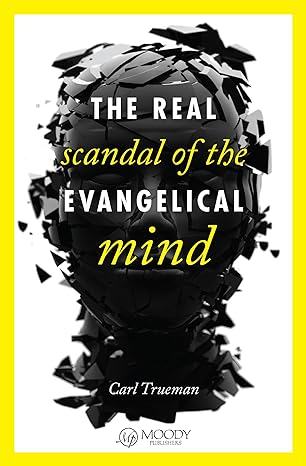A Book Review from Books At a Glance
by Fred G. Zaspel
It’s been more than fifteen years now since Mark Noll published his successful The Scandal of the Evangelical Mind in which the (then) Wheaton professor criticized evangelicals for their intellectual obscurantism. Evangelicalism’s preoccupation with dispensationalism and six-day creationism, he argued, had left it with no academic, intellectual, or cultural credibility.
We may or may not agree with Noll’s specific points of example, but it is difficult to argue that evangelicalism has lost considerable intellectual credibility. In terms of political involvement and personal evangelism, however, his argument would seem to lose much of its force.
But Trueman’s objection to Noll falls along more fundamental lines. As he summarizes, “When Mark Noll declared that the scandal of the evangelical mind was that there was no mind, he meant to criticize the lack of cultural and theological engagement among evangelicals. I agree there is a scandal involving the evangelical mind, though I understand the problem in the exact opposite way. It is not that there is no mind, but rather that there is no evangelical.” Or again, “The real scandal of the evangelical mind currently is not that it lacks a mind, but that it lacks any agreed-upon evangel.”
That is to say, “evangelicalism” means so much anymore that it scarcely means anything at all. Indeed, in our day one can deny God’s knowledge of the future and still be considered “evangelical.” Trueman’s brief essay could make one wonder if a genuine “evangelicalism” survives at all. If it will survive, he argues, it must learn to define itself, for if the last hundred years have shown anything, it is that doctrinal indifferentism cannot withstand heterodoxy. Trueman is under no delusion that a mere creedalism will preserve orthodoxy. But he is certainly right in his admonition that apart from a willing and convinced adherence to a Biblically defined faith the “Christianity” of the apostles would disappear.
In short, if (as per Bebbington) an understanding of “evangelicalism” in terms of its focus on Scripture, the centrality of the cross, conversion, and activism/evangelism will have any relevance, it will only be as these concepts are given clear and robust Biblical definition.
Perhaps we are overly concerned that preserving a doctrinal Christianity will leave us perceived as narrow and sectarian. But then perhaps our lack of concern for doctrinal Christianity has left us so broad as to be scarcely other than secular. Certainly, no one wishes to be marginalized or considered irrelevant. But being Christian entails a recognition of divinely revealed truth, and it also entails a willingness to bear the reproach of the cross. Yet our outlook must never be doom and gloom, for it is by the faithful proclamation of this divinely revealed truth, in the power of the Spirit of God, that the saints will overcome the world (Rev. 12:11).
Trueman’s essay, reminding us of the central importance of Christian truth, deserves to be read widely. It is brief, simple, and easily accessible. Highly recommended.
(This review was first published in Hope’s Reason: A Journal of Apologetics (Vol. 2, No. 1, 2011) at www.apologeticsjournal.com.)
